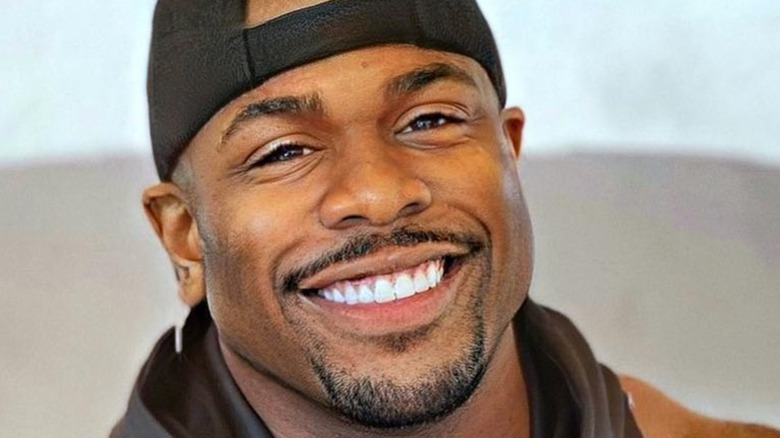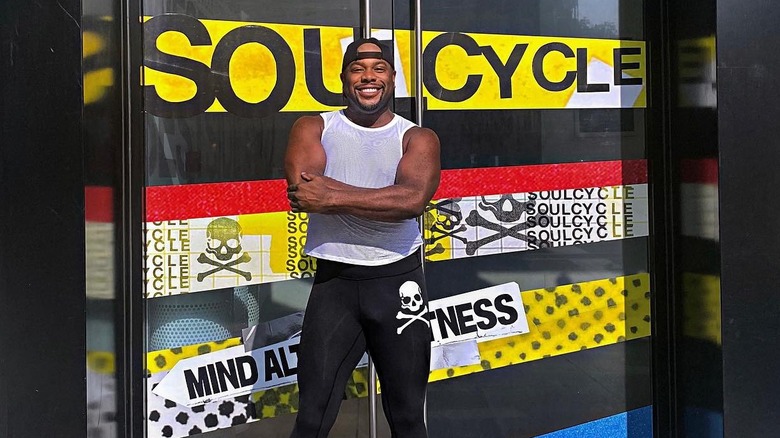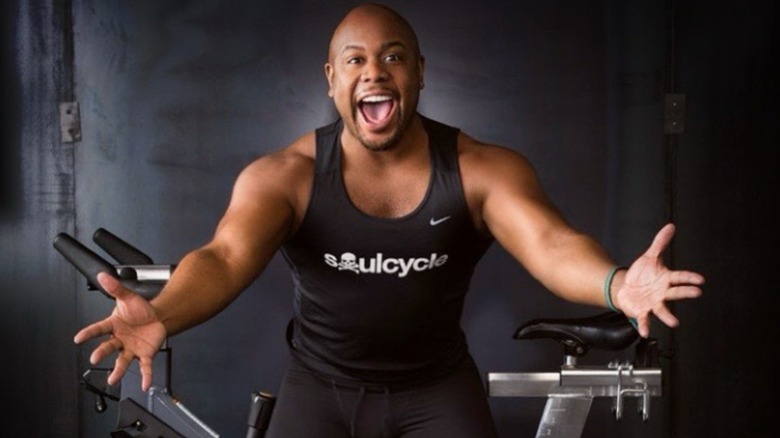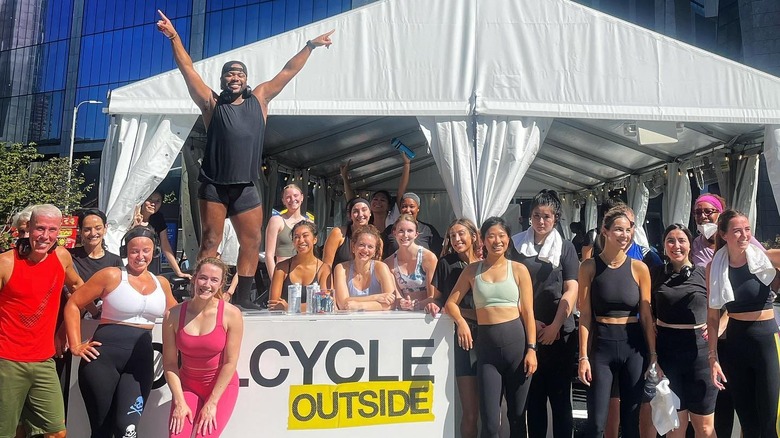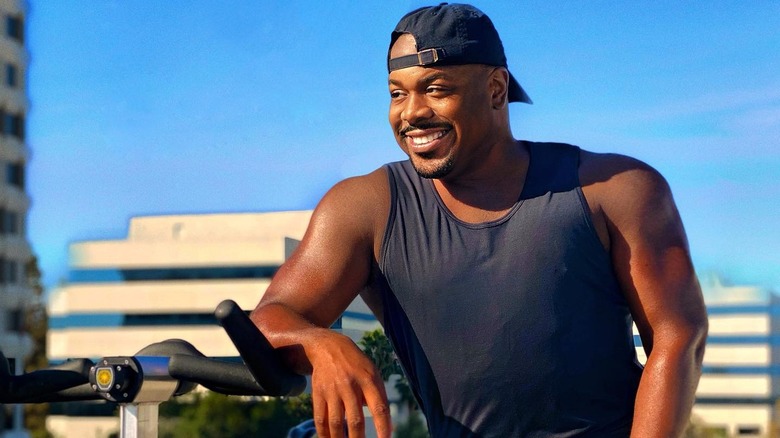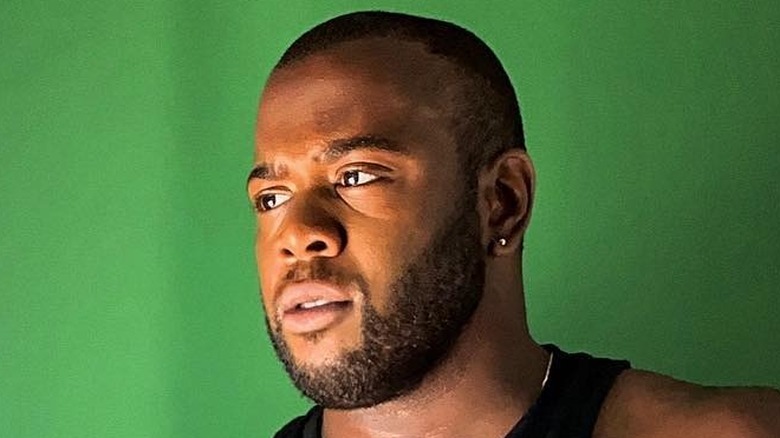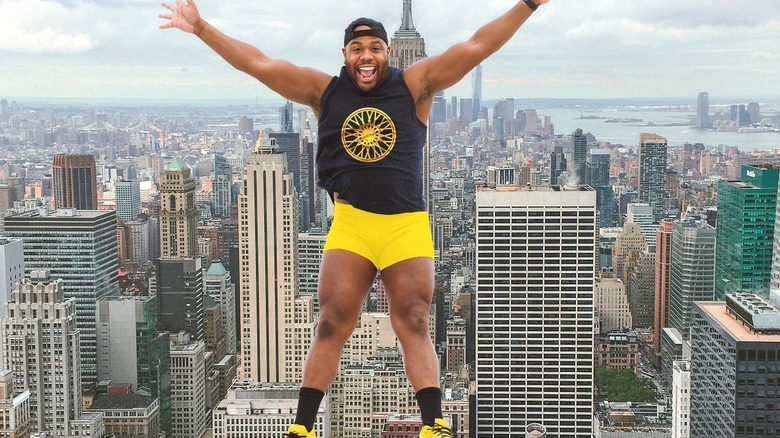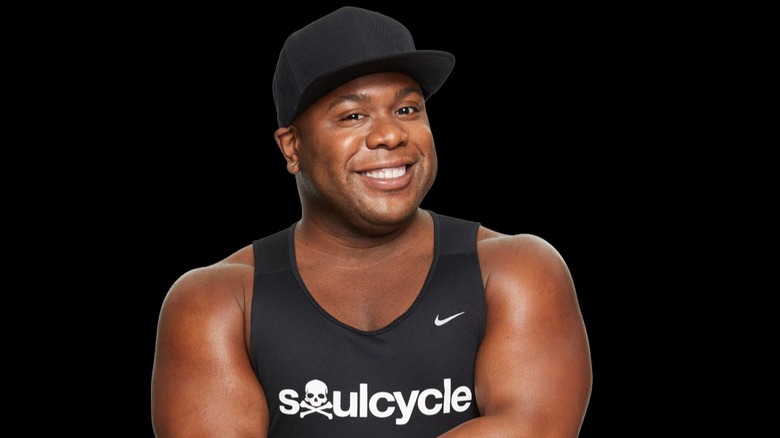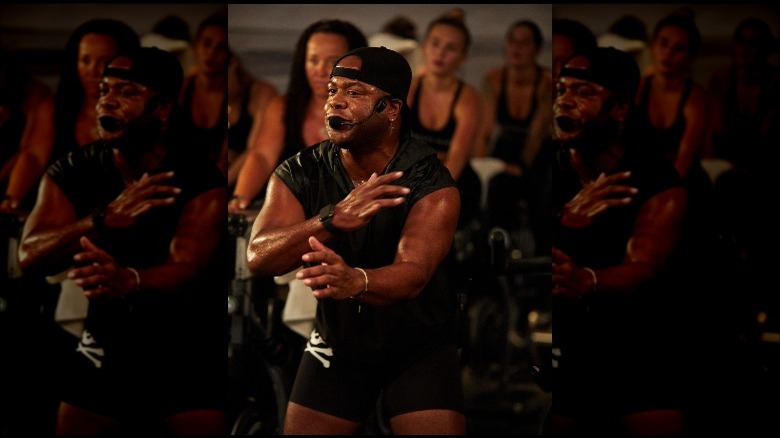SoulCycle Instructor Kamelle Mills Talks Self-Love And Representation In The Fitness Industry – Exclusive Interview
As a transplant from the South, Kamelle Mills wasn't used to the aloofness of New York City. So, when he walked into his first SoulCycle class and they welcomed him with warm enthusiasm, he was immediately hooked. There, Mills found not only community but also a safe space where he was allowed to be his authentic and ebullient self at all times.
SoulCycle took Mills on a journey of self-discovery that was about so much more than getting fit. Letting his authentic self out in classes and with others in the SoulCycle community taught him the importance of accepting himself exactly as he was and fostering self-love above all else. Because of his positive energy, people loved being in classes with Mills and exploring their own paths with him. Eventually, the instructors at his home studio pushed him to audition to become an instructor. Though Mills wasn't sure he could do it, he was encouraged by the fact that the SoulCycle was filled with instructors that spanned the entire spectrum of humanity. Mills had taken classes with people of all different colors, genders, sexualities, and body types, which made him feel like he too could get up on the podium.
In an exclusive interview with Health Digest, Mills shared why representation is so important in the fitness world, how fitness can lead us on our self-love journeys, and why fitness should be about so much more than working out.
Falling in love with SoulCycle
What can you tell us about your history with movement in general? Have you always liked to work out? Did you do sports?
I have a long history in football. My parents let me play football. So that is my most pre-SoulCycle experience with fitness. And then in college I played intramural volleyball.
Oh, cool. Nice. So how did you discover SoulCycle?
I was performing all over New York City off Broadway, off-off Broadway, and off-off-off-off Broadway. I was trying to carve out a niche for myself. I have an emphasis in playwriting. I have a degree in theater, but I started writing my one-man shows and someone that came to my show — they were a part of the musical theater family — and they were taking SoulCycle classes. And I was like, "What is that?" And then all of a sudden I was up in there, like, "Give me two scoops."
So you loved it from the [start]?
Oh my God. Just walking into the room, I promise. New York is a tough city. ... I'm from the South and to walk into a place where you're pushing, in New York, you're pushing away from people trying to get through stuff and walking into SoulCycle, like, "Hello, welcome!" Big, bright white light. "Can we charge your phone? Here's some water, let's help you set up your bike." ... Before I even started the class, it was such a beautiful, welcoming experience. ... One thing I thought was beautiful is I saw different types of bodies, different races, different people do this. And when I thought of fitness, I thought of big guys and skinny girls and all this stuff. So that was a beautiful thing that people could see this potential in me no matter what I look like that you could do this job and do it well.
I love that. And what made you want to be an instructor?
To be honest, what I love about SoulCycle is you can walk away from each class feeling like you can literally do anything. But the one thing I didn't think I could do was be an instructor. ... I would take class, I would have so much fun, and I would make noise and scream and shout. And they were like, "You should audition." I was like "Me?" They're like, "Yes, you! Audition!" And before you knew it, I was auditioning. And then before I knew it, I was on the schedule.
A passion for performance
How does your passion for performance impact your SoulCycle classes?
When I was little, my mom always ... looked at me in terms of performance. She was like, "You can do this. You can do this thing on stage." And I was like "Me?" She's like, "Yeah."
So then that passion, becoming almost a different person or really stepping into your higher self up there, makes it so accessible. When I did one-man shows, it was not just about me. It was about this vulnerable exchange between the audience and inspiring them. And it's not much different than SoulCycle. It's ... I always say "I have the mic, but you have the magic." So that there's an exchange. Like, I'm leading the class but it's about both of us. And that happened on stage with me often that it was a give-and-take exchange of energies. And although I was on the platform or on the podium, it was all of our experience.
Absolutely. Do you still perform professionally?
I do. I just did a show. I moved back to New York in November and now I'm moving to Miami in two weeks but as soon as I got there, I got cast in a show called Monuments. And that's the last show I did in September.
Oh, that's fantastic. Are you going to do any performing down in Miami?
I hope so. That's what I was dreaming about last. I got to find it again: Speak it into existence.
There you go. Manifest it.
Creating the perfect movement playlist
One of the things that you talk about a lot is music and how that impacts your movement. So how do you go about creating a perfect playlist for your classes?
Let's talk about music. So music, I think music is the language of the soul and it doesn't matter what language it's in, no matter [the] genre, even. Music makes you move. When I think about SoulCycle, when I think about music ... there's so many different types of people and they have different types of music. When I was introduced to SoulCycle, I initially only liked hip-hop and R&B, what I was familiar to moving with. But as I got to know different people — the word expansion keeps coming to mind — I expanded my music taste because I met different people. And each playlist is different because each day is different.
And my interactions with people are different and my mood is different and it's like a canvas every single time. You can just paint whatever you want to paint. I love that it can change right before I go into class. I'll be introducing [myself to] someone, they tell me about, I don't know, how they have survived cancer or that, I don't know, their daughter is in the room [saying], "Oh, this song reminds me of my mom," and I'll just throw it on the playlist right before class and be like, "This song reminds me of my mom and look on the front row, we got Michelle and her baby."
I wouldn't think that. Usually in other music-movement fitness programs, you're creating the playlist and tailoring the class to the playlist. So you let it happen intuitively?
Oh, absolutely. And I am an Aries, honey. I'm like, "What's going on today?" And I could be controlling. So, in the beginning, I was very controlling, like this has to be like this ... and that's another thing that I am trying to really embrace and preach is letting go. And so when there's a release, there's a flow. And when I make my playlist, I'll even talk to my riders online, "Hey, what do you want to hear today?" Or "How you feeling?" I'm trying to integrate that. So then the energy is present and it's current and it's right there versus something I felt last night.
That's awesome.
Thank you.
So in general, how does movement work with music for you? In SoulCycle, out of SoulCycle — what is that connection for you?
The connection to music with me, I'm an emotional person. And again, a performer, an artist, music is like the soundtrack to life. And movement at SoulCycle is to the beat typically. And there's something that happens when you move your body, you move your mind. So they come hand in hand especially with this beautiful thing we call SoulCycle, they come hand in hand.
Working in and working out
One of the things that you do in your class that not everybody does is start each class with an inspirational quote. So where did that come from? Where was that idea born?
Who told you this, girl? You've been in my class?
I've been on your Instagram!
Sometimes I start with a quote. I think that I try to be different. I try to evolve. Some classes start with a quote, some classes I'll stop in the middle and be like, "Let me tell you about this quote I heard." I did this the other day in Palm Beach. ... But I want it to be more than a workout. It's in the title SoulCycle. So when I incorporate things like quotes or stories, it's like a one-man show. It's like performing. I want working out to be working in as well. This element of I'm working out, but I'm doing this work within. Does that make any sense?
Absolutely. Can you go into a little more of that concept [of] "working in" with "working out"? That's so interesting.
I always say "What good is a hot body with a lukewarm spirit?" So I've had my fair challenges with eating and being every and any size. And ... I finally realized that my fitness motivation is self-love, as corny as that sounds because, in order for me to love myself, I need to move. I feel like to feel good in my body, I need to move. We were made to move. We have millions of nerves, countless muscles, these strong bones. We were made to move.
And I think our soul is a reflection of this thing that we are held in called a body. And if we move it, then we can really get the soul going and the mind going. It's a connectivity, it's an inner working. And I think it all comes in one. ... I think sometimes it may start on the inside and manifest on the outside and vice versa. And sometimes in this crazy world that we live in, sometimes it's harder to get this thing going, because we're tired all the time. ... But if we can get them both going at the same time, then it's a win-win.
The power of 'un poco'
What's your secret for motivating the people who come to your classes?
I don't know if it's a secret, but I want everyone to feel seen, to truly feel seen. Because in this fast-paced world, and of course we have online stuff ... people even want to be seen there, how many likes can I get? But there's nothing. I think Maya Angelou says it like this: 'People can't always remember what you say or what you do, but they can remember how you make them feel.'
And everybody in my class, I try to remember everyone's name. I try to remember facts about people because I don't want to just be your SoulCycle instructor. I want to be the person that makes you feel seen so that you can go out and see other people. That's my secret — I am hell-bent on making people feel seen and appreciated and inspired. That is my thing to inspire people.
On that note, inspiring people, I feel like this time of year is a big time for, well, maybe not in Miami where it's sunny all the time, but up here in the north, it's a time of getting stuck in movement ruts. So what advice do you have for people who are just stuck in that place where they don't feel like that movement?
Un poco. That's this thing I heard in this sermon once, "un poco." [The minister] was talking about going to Mexico and someone asked her if she could speak Spanish and she goes "un poco." She was like, "Use it! Just all we need is a little bit." I feel like that's a theme I also am trying to interweave and spread out. You just need a little bit.
Maybe today it's just, I stood up. I stood up. Today I walked around for five minutes. Today I walked around for 10 minutes. Just a little movement and just a little bit, — un poco. Just move a little bit. And then whatever you have is worthy of that movement. Whatever you have is worthy of that movement. So just, if it's just, I'm going to walk around my kitchen, pace my kitchen for five minutes, then you'll recognize what that may have felt like for you. There's no losing. There is no losing. And just a little bit, and then increments, take little, little pieces and put them together.
Creating a diverse movement routine
What kind of non-SoulCycle workouts are your favorites?
You know what I love and I never thought "this would be me"? I love lifting. I love it. And it could be because my trainer is motivational too. He talks to me and so I'm like "Ahh." But it's cross-training. ... And he told me this too — which I didn't even think about and I feel like a hypocrite — I was like, "I want to look like this." He was like, "What does that mean? How do you want to feel, what are your goals for you? What are your goals that are long term?"
Not about physicality, lifting, and just figuring out how do I make this body strong forever so that it can help me? I always try to make a connection to things that are bigger than my body. Like my arms need to be strong for the people I hold. My legs need to be strong because I need to stand up for what I believe in — trying to make it about that so that there's no limit to what I want to do when it comes to people I love and the things I want to stand up for.
Absolutely. What are your favorite outdoor movements?
I was in Palm Beach where it was nice. So I get to cheat a little bit, but just a walk and there's no music, there's no nothing, just the sound of my breath and maybe the birds chirping and the cars honking, feeling alive. And that is back to the inner workings of your body. What do they call it? Just being present. No distractions. Just being outdoors — and especially when you get to green things. I know that's hard for people in the north, but just being around things that are alive besides myself and that aren't human beings is just a reminder of how big and beautiful the world is and how capable.
If a seed can rush to the surface, past the weight of the Earth, I can push through anything in my life that's on top of me. And just seeing those miracles happening, it must take a lot of energy for a flower to blossom. If that little thing could do that, I can do strong things too.
Representation in the fitness industry
We touched on this a little bit earlier, but I'd love to hear more of your thoughts on why representation is so important in the fitness world.
Yes. Let's talk about it. Representation is important in general, but especially in the fitness world because it can be intimidating. And this is what I love about SoulCycle, is that when I went there, I saw people of different colors in the class, different colors, different shapes, different sizes, different challenges. I've seen people with, the word I will use is a handicap, but they're still there working out. Seeing people show up and show out, despite what society tells you looks like working out, what you should look like to work out.
And then to take it a step further, that representation is so important because I did see people of color. I did see people of different shapes and sizes on the roster at SoulCycle. So even though I was intimidated and hesitant and apprehensive, that little bit of hope, that "un poco" of hope, was there because I saw the likeness of myself. So it's not only important, it's imperative.
And you think SoulCycle has that kind of diversity in their instructors as well?
Yes, I do believe that. We do have a diversity, especially with our mentors. Our mentors are an array of people — black, brown, gay, straight, small, strong, whatever it is, different shapes and sizes. And it's inspiring. It gave me permission to let go. I used to kill myself trying to look one way. And then I was like, "It's not about that." Then I got to be my real self and own my body in its true form strong, but not looking like whatever so and so looks like.
Self-love is key
In a larger sense, what's influenced your relationship to fitness?
It goes back to self-love again. Oh, I'll say it like this. The way I had to value myself to take care of myself. And that also means taking breaks, eating what I want to. But I have to value myself to have the full expression of myself manifested. I have to value who I am and what I'm here to do.
I have to believe in a great calling, a divine calling in myself. So then there's a value set on me that I am going to take care of myself. Am I always good at it? No. And that means I need to work more on my value.
Because a lot of times we just live in this body. We don't even say hello to ourselves in the morning or give ... I started giving myself a high-five in the mirror. That's a relationship that has to be a valuable relationship. And it's like a person you love. If you value your partner or your parent or your sibling or your best friend, then you'll treat them in a different way. But if you don't value them, you don't respect them, then they get any treatment in the world.
Catch Kamelle at SoulCycle Miami. Book a bike here.

